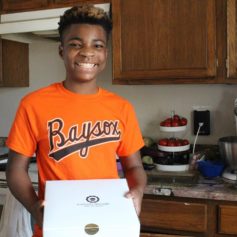My son was often euphemistically referred to as “busy” when he was a child.
Teachers were convinced he had attention deficit hyperactivity disorder (ADHD) and on three separate occasions, at different schools, I was asked to have him tested. His doctors assured me that my son was healthy, did not have the disorder, but that he was also very, very smart and would find ways to entertain himself if allowed to get bored at school.
I had a flashback to those days when I read a story in The New York Times on Monday that new data from the federal Centers for Disease Control and Prevention (CDC) showed that one in five high school aged boys and 11 percent of school-age children have been diagnosed with ADHD.
People with ADHD often have a combination of problems, including an ability to sustain attention for an extended period of time, impulsive behavior and hyperactivity, but it also may be reflected in low self-esteem, poor performance in school and problems with relationships.
According to the report, boys were more likely than girls to be on medication for the disorder and 2.7 million of 4.1 million children diagnosed with ADHD were likely to be under prescription treatment.
There was also a disproportionate distribution of medication treatment, supporting earlier reports by the Food and Drug Administration, which found uneven distribution of common ADHD medication.
“State-based rates of ADHD medication treatment among those with ADHD ranged from 33 percent in Nevada to 79 percent in Mississippi. The lowest rates of medication usage were documented in five Western states (Nevada, California, Alaska, Hawaii, and New Mexico). The highest rates of medication usage were documented in five Southern states (North Carolina, Louisiana, West Virginia, Arkansas, and Delaware),” the CDC report said.
Other studies have shown that white and African-American children are more likely to be diagnosed with ADHD than children of other races.
In a recent study of the medical records of nearly 850,000 children, ages 5 to 11 years old, published in JAMA Pediatrics, African-American children are diagnosed with the hyperactivity disorder at much greater rates than other ethnic and racial groups.
It is precisely this knowledge that makes many black parents reluctant to have their children tested for the disorder or to allow their children to take ADHD drugs. That gut feeling that their children are overly diagnosed is reinforced by a 2007 study that found “The instrumentation that is used to diagnose the disorder is culturally insensitive,” Psych Discourse, the website of the Association of Black Psychologists, reported.
“A majority of African American parents do not view ADHD as a legitimate disorder. Instead, they feel that teachers and medical professionals are quick to (mis)diagnose minority children with the disorder. African American parents also believe that the early use of medication for a disorder that is not legitimate, could eventually lead to drug addiction later in life.”
The latest report from the CDC said there had been a 16 percent hike in the number of ADHD diagnoses overall since 2007 and a 53 percent increase over the past decade.
The real question is whether these higher figures indicate a better ability to diagnose the disorder or are they being used to justify medication aimed at calming behavior or improving school performance? The report did not even take on the use of ADHD drugs by older teens and young adults, especially the drug Adderall, to sharpen focus and the possibility of abuse of those drugs.
That is another issue entirely.
So what’s a parent to do if her child is having performance issues at school and teachers and administrators are suggesting ADHD is the problem?
The website blackdoctor.org said there is no simple answer, but lists suggestions for how to proceed to get a professional opinion that can be trusted.
“No single test can diagnose a child as having ADHD. Instead, a licensed health professional needs to gather information about the child, and his or her behavior and environment. A family may want to first talk with the child’s pediatrician. Some pediatricians can assess the child themselves, but many will refer the family to a mental health specialist with experience in childhood mental disorders such as ADHD,” the site says.
“The pediatrician or mental health specialist will first try to rule out other possibilities for the symptoms. For example, certain situations, events, or health conditions may cause temporary behaviors in a child that seem like ADHD.”
The site also provides a range of options that parents may want to consider if their child is indeed diagnosed with ADHD, including medication, dietary changes, psychotherapy, education or training, or a combination of treatments.
If there is no medical issue at play, having a series of meetings and, perhaps, testing to see where your child is academically should provide some insight into performance issues. It may be as simple as a change of classroom or setting up a study schedule and eliminating distractions.
But the first step is to overcome the fear of the acronym ADHD and then get the facts before making a decision.
Jackie Jones, a journalist and journalism educator, is director of the career transformation firm Jones Coaching LLC and author of “Taking Care of the Business of You: 7 Days to Getting Your Career on Track.”


